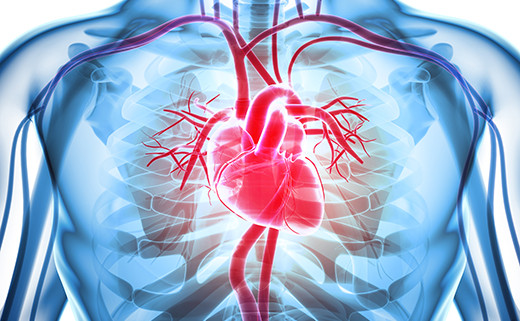Definisi
Gagal jantung merupakan kondisi ketika otot jantung tidak dapat memompa darah sebagaimana mestinya. Pada kasus gagal jantung akut, terjadi penurunan fungsi jantung secara tiba-tiba, cepat dan mengancam jiwa. Ketika kondisi ini terjadi, jantung Anda masih tetap dapat bekerja, tapi tidak dapat mengirimkan cukup darah yang kaya oksigen ke seluruh tubuh.
Jantung merupakan organ yang memiliki peran penting dalam sistem peredaran darah manusia dan keberlangsungan hidup manusia. Secara anatomi, struktur jantung dibangun oleh 4 ruang. Ruang jantung tersebut adalah serambi kanan, serambi kiri, bilik kanan dan bilik kiri. Masing-masing ruang jantung ini memiliki fungsi tersendiri dalam memompa dan menyalurkan darah ke berbagai organ tubuh.
Penyebab
Kondisi gagal jantung akut terjadi karena adanya kondisi medis yang mendasarinya. Beberapa kondisi medis yang dapat menyebabkan terjadinya gagal jantung antara lain:
- Kecanduan alkohol
- Pembekuan darah di paru yang kemudian menyebabkan terjadinya sumbatan
- Diabetes
- Tekanan darah tinggi atau hipertensi
- Stroke
- Infeksi virus yang berdampak pada jantung
- Gangguan pada kelenjar tiroid
- Penyakit jantung koroner
- Penyakit pada katup jantung
Kondisi ini kemudian membuat jantung Anda bekerja lebih keras dan menyebabkan beberapa perubahan pada jantung dan pembuluh darah Anda. Beberapa perubahan tersebut seperti pembesaran jantung, penurunan aliran darah, penyempitan pembuluh darah, denyut jantung yang tidak beraturan, dan kaku pada otot jantung.
Faktor Risiko
Terdapat beberapa faktor yang meningkatkan risiko seseorang mengalami gagal jantung. Faktor ini tak jarang berkombinasi sehingga dapat meningkatkan risiko. Beberapa faktor risiko gagal jantung berupa:
1. Penyakit Jantung Koroner
Penyakit ini menyebabkan sumbatan pada pembuluh darah koroner yang mendarahi otot jantung. Hal ini akan memengaruhi pengantaran darah yang mengandung oksigen ke otot jantung. Akibatnya, terjadi kelemahan otot jantung dan dapat menyebabkan terjadinya gagal jantung.
2. Serangan Jantung
Serangan jantung juga dapat menyebabkan kerusakan pada otot jantung sehingga jantung Anda tidak lagi dapat memompa darah dengan baik.
3. Tekanan Darah Tinggi
Pembuluh darah memiliki struktur yang elastis, sehingga bila jaringan pembuluh selalu dilewati darah yang bertekanan dinggi, bisa mengakibatkan kerusakan struktur pembuluh. Dalam jangka panjang bisa memengaruhi kesehatan jantung.
4. Kelainan Jantung Bawaan
Kelainan jantung bawaan merupakan gangguan pembentukan bilik, serambi, atau katup jantung pada anak sejak dalam kandungan. Struktur bagian jantung yang tidak sempurna dapat memengaruhi jantung dalam menjalankan fungsinya.
5. Diabetes
Penyakit gula atau diabetes dapat meningkatkan risiko Anda mengalami tekanan darah tinggi dan penyakit jantung koroner. Secara tidak langsung, faktor risiko seseorang mengalami gagal jantung akan semakin meningkat bila Anda memiliki diabetes bersama tekanan darah tinggi.
6. Obesitas
Orang yang mengalami obesitas memiliki risiko lebih tinggi untuk mengalami gagal jantung.
7. Merokok dan Minum Alkohol
Rokok tembakau dapat meningkatkan risiko Anda terkena penyakit jantung dan mengalami gagal jantung. Konsumsi alkohol berlebihan dapat membuat otot jantung menjadi lemah sehingga berperan dalam peningkatan risiko terjadinya gagal jantung.
Gejala
Gagal jantung dapat berlangsung lama (kronis) atau muncul secara mendadak (akut). Terdapat beberapa kemiripan keluhan yang muncul pada gejala gagal jantung kronis dan gagal jantung akut. Gejala yang paling sering muncul pada kasus gagal jantung akut berupa pembengkakan yang muncul tiba-tiba pada kaki dan perut Anda. Pembengkakan ini juga menimbulkan penambahan berat badan secara cepat karena tubuh menahan cairan. Anda juga akan merasa mual atau hilang nafsu makan.
Selain gejala-gejala di atas, gagal jantung akut bisa disertai gejala lain, seperti:
- Kelemahan
- Mudah lelah
- Denyut jantung yang cepat dan tidak beraturan
- Batuk persisten yang bisa disertai dahak berwarna putih atau merah muda
- Sesak napas yang bisa disertai suara mengi
- Penurunan kemampuan untuk berkonsentrasi
- Nyeri dada bila gagal jantung diakibatkan oleh serangan jantung
Jika kondisi ini tidak ditangani dengan baik, gagal jantung dapat berubah menjadi serangan jantung. Serangan jantung terjadi karena adanya blokade di pembuluh darah. Blokade dapat terjadi karena adanya sumbatan lemak atau pembekuan darah. Blokade ini akan mencegah darah kaya oksigen mencapai jantung sehingga sel jantung tidak mendapatkan asupan oksigen yang cukup. Lebih lanjut, hal ini akan menyebabkan terjadinya kematian pada sel otot jantung, mengganggu jantung untuk memompa darah, dan menyebabkan munculnya gejala serangan jantung berupa nyeri pada dada. Kondisi ini dapat mengancam nyawa sehingga harus segera dibawa ke unit gawat darurat rumah sakit terdekat.
Diagnosis
Wawancara Keluhan
Dokter Anda akan menanyakan beberapa hal yang berkaitan dengan keluhan yang Anda rasakan serta faktor risiko yang Anda miliki terkait penyakit kardiovaskular. Riwayat penyakit lain yang Anda miliki serta riwayat penyakit pada keluarga Anda juga dapat ditanyakan oleh dokter.
Pemeriksaan Fisik
Pada pemeriksaan fisik, dokter Anda akan mendengarkan suara jantung dan paru Anda menggunakan stetoskop, untuk mendeteksi adanya bendungan cairan di dalam paru. Dokter Anda juga akan melakukan pemeriksaan pada pembuluh darah leher serta pembengkakan pada area kaki Anda.
Pemeriksaan Penunjang
Setelah melakukan pemeriksaan fisik, dokter Anda akan melakukan pemeriksaan penunjang. Pemeriksaan yang dilakukan dokter Anda dapat berupa:
1. Pemeriksaan laboratorium
Dokter dapat memeriksa darah, elektrolit, gula darah, kolesterol, fungsi ginjal, serta biomarker gangguan jantung. Dengan pemeriksaan laboratorium, dokter dapat mencari tanda-tanda penyakit yang dapat memengaruhi jantung.
2. Pemeriksaan rontgen dada
Pemeriksaan pencitraan ini dilakukan untuk mengetahui kondisi paru dan jantung Anda, bila terdapat pembesaran jantung atau penumpukan cairan di area jantung dan paru Anda.
3. Pemeriksaan EKG (elektrokardiogram)
Pada saat pemeriksaan EKG, akan dilakukan pemasangan elektroda ke dada dan kedua kaki serta tangan Anda. Elektroda ini akan merekam sinyal pada jantung yang kemudian akan dinilai oleh dokter Anda. Dari EKG, bisa diketahui bila pasien menderita penyakit jantung koroner, gangguan irama jantung, atau pembesaran jantung.
4. Angiografi
Pemeriksaan ini disebut juga sebagai kataterisasi jantung, dilakukan untuk memeriksa kondisi pembuluh darah dalam jantung.
Tata Laksana
Pengobatan darurat yang dilakukan untuk menangani gagal jantung akut bertujuan untuk mengembalikan aliran darah dan kadar oksigen. Dokter akan mengklasifikan gagal jantung pasien berdasarkan tingkat aktivitas yang bisa dilakukan pasien, apakah pasien masih bisa beraktivitas dengan baik, atau gagal jantung sudah sangat membatasi aktivitas pasien. Terapi yang diberikan tergantung dari kondisi klinis dan penyebab yang mendarsari. Terapi yang bisa dilakukan dokter Anda berupa:
- Pemberian oksigen dengan menggunakan masker
- Pemberian obat yang berfungsi untuk melebarkan pembuluh darah yang menyempit bila terdapat tekanan darah tinggi
- Pemberian obat untuk mengeluarkan penumpukan cairan dari dalam tubuh
- Pada beberapa kondisi, kasus gagal jantung akut mungkin memerlukan prosedur pembedahan sebagai terapi
Setelah Anda dinyatakan boleh pulang ke rumah, dokter Anda akan memberikan Anda beberapa jenis obat yang bertujuan untuk memaksimalkan kesehatan jantung Anda. Dokter akan mulai menyarankan untuk menjaga tekanan darah, menghentikan kebiasaan merokok, rutin berolahraga, dan menghindari makanan asin. Patuhi anjuran dokter Anda dan lakukan pemeriksaan secara berkala.
Komplikasi
Terdapat beberapa komplikasi yang dapat terjadi pada gagal jantung akut. Komplikasi yang terjadi tergantung pada tingkat keparahan gagal jantung akut yang Anda alami serta usia Anda. Komplikasi yang dapat terjadi berupa:
- Kerusakan ginjal atau gagal ginjal
- Kerusakan pada hati karena penumpukan cairan pada hati
- Pembesaran otot jantung
- Gangguan pada katup jantung
Pencegahan
Pencegahan gagal jantung akut dapat dilakukan dengan beberapa cara, yaitu:
- Konsumsi makanan yang bergizi seimbang dan hindari makanan yang mengandung terlalu banyak garam
- Jika Anda merokok, maka segera berhenti merokok
- Jika Anda memiliki penyakit yang menjadi faktor risiko terjadinya gagal jantung seperti tekanan darah tinggi dan diabetes, kontrol secara berkala dan patuhi anjuran dokter
- Jaga berat badan agar tetap normal
- Rutin berolahraga
Kapan Harus Ke Dokter?
Segera bawa ke unit gawat darurat untuk mendapat pertolongan medis jika muncul gejala seperti:
- Nyeri dada
- Pingsan atau kelemahan yang berat
- Denyut jantung cepat dan tidak teratur yang berhubungan dengan napas pendek, nyeri dada, atau pingsan
- Napas pendek parah yang terjadi secara tiba-tiba, disertai dengan batuk yang mengeluarkan dahak berwarna putih atau merah muda
Segera kunjungi dokter Anda jika Anda mengalami gagal jantung dan merasakan munculnya gejala gagal jantung yang baru. Jika Anda telah melakukan pengobatan, tapi tidak terlihat adanya perubahan, segera konsultasi ke dokter Anda untuk mendapatkan terapi yang sesuai.
Mau tahu informasi seputar penyakit lainnya? Cek di sini, ya!
- dr Hanifa Rahma
Mayoclinic.org. (2021, 10 Desember). Heart failure - Symptoms and causes - Mayo Clinic. Diakses pada 30 Maret 2022, dari https://www.mayoclinic.org/diseases-conditions/heart-failure/symptoms-causes/syc-20373142
Healthline.com. (2022, 27 Januari). Acute Heart Failure: Types, Causes, and Symptoms. Diakses pada 30 Maret 2022, dari https://www.healthline.com/health/heart-failure
Clevelandclinic.org. (2022, 21 Januari). Acute Heart Failure: Types, Symptoms, Causes and Treatment. Diakses pad 30 Maret 2022, dari https://my.clevelandclinic.org/health/diseases/17069-heart-failure-understanding-heart-failure
Kurmani, S., & Squire, I. (2017). Acute Heart Failure: Definition, Classification and Epidemiology. Current heart failure reports, 14(5), 385–392. https://doi.org/10.1007/s11897-017-0351-y












